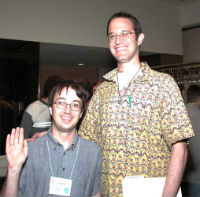Mar 27, 2009 Comments Off on Who is Matthew T. Grant?
Who is Matthew T. Grant?
Matthew T. Grant has chosen as his tag-line, “Tall Guy. Glasses.” He has done so for several reasons. First of all, he is above average in height for the human male (6′ 7″). Second of all, he wears glasses (I’ve been told that contacts are out due to my astigmatism. If any opthamologists are reading this and believe that I am misinformed, please contact me at mtg_at_matthewtgrant.com).
The most important reason for this fairly pedestrian tag-line is that I, Matthew T. Grant, have a variety of interests, several well-developed abilities, and a non-linear career path. I have established and run a corporate training department, directed an array of internal and external communications efforts for a global company, served as a business process consultant, taught at several colleges, and performed in a number of rock bands in San Francisco, Boston, and Ithaca. I received my PhD in German Studies from Cornell University (1993) and wrote my dissertation on mass media and political militancy in West Germany in the 1970s, My bachelor’s degree in German Studies was granted by Stanford University (1985).
As far as my aforementioned abilities are concerned, those that may be of most interest to you as an individual or representative of an organization are as follows. I can write real good (that grammatical incorrectitude was intentional). I’ve been involved in blogging, podcasting, and various online communities for years. I’m an entertaining and informative presenter (that link takes you to the slides for a recent webcast I conducted. To hear the ‘cast itself, go here – it’s free, but requires registration). I am also extremely comfortable hosting large events as well as facilitating small discussion groups.
To put this all another way: I’m skilled at acquiring and comprehending information and then communicating it to people in the way best suited to them. By “information,” I mean just about anything and by “people” I mean just about anyone.
Allow me to illustrate this ability in action. While serving as corporate spokesperson, I enlisted our local field managers to find me speaking engagements by telling them, “I can talk about anything.” The then-manager of our Osaka office took me up on my offer and said he had me scheduled to speak on “business method patents” at a large conference in his native city. I told him I didn’t know anything about that and he responded with, “But you said you could talk about anything.”
Hoisted on my own petard, I delved into the controversy surrounding the patent Amazon received for their “one-click” buying method and gave a presentation to three hundred Japanese business folk calling for greater openness and flexibility with regards to intellectual property in the Web era (you could call my approach anachronistically, “Lessig-esque“). Although the audience seemed more interested in learning how to make money from patents, rather than how not to, nobody said I didn’t know what I was talking about.
So, that’s Matthew T. Grant, in nuce. This blog will now return to its regularly scheduled programming.
 I’ve got personal branding on the brain these days, and not just thanks to
I’ve got personal branding on the brain these days, and not just thanks to